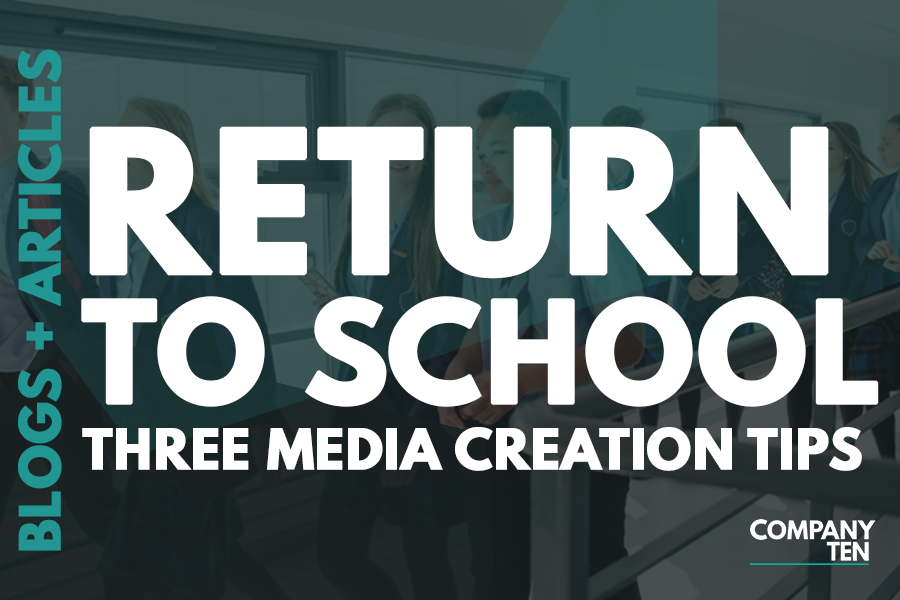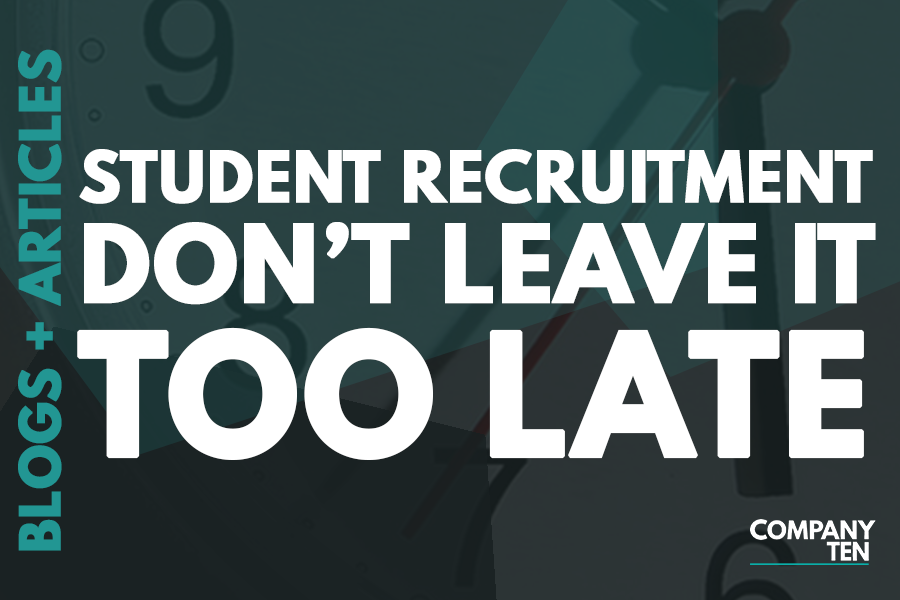Three things that schools don’t do, but should.
[These blogs are supposed to be short, punchy thoughts from our experts. Unlike the polished copy that we create for our clients, these thoughts and notes will be more informal and have a chatty and personal style. Enjoy!]
We work with schools day in and day out, and more often than not they are a delight to work with. Often I find my own measure of a school’s quality being ‘would I send my own child to this school?’ Occasionally it’s a ‘NO WAY!’ Usually its a ‘sure!’ Sometimes it’s more of a ‘that’d be cool’ and rarely, but memorably I think ‘I WISH I had children already, so I could send them HERE!’
There are loads of things that make a school stand out in my eyes, I do after all have the benefit not shared by many, of seeing lots of schools of varying standards, and so I have more to compare. I also don’t have the blinkered view that some schools have of themselves - where there is sometimes a feeling that ‘if we say it enough times, maybe it will come true!’
Part of what we do, through the work that we do with schools concerning their marketing efforts, is to shine a light on a school’s best bits. When we start doing that, a beautiful thing happens. The schools themselves start to recognise their selling points, their USPs, and begin to actively look for their own best bits. Often finding that they’re not what or where they thought.
Here’s three things that schools don’t do, but they should, and they should start doing them as soon as they finish reading this blog!
1. They don’t realise just how special they are.
I mean that sincerely. Schools are special places. Aside from the safe haven, pillars of the community side of things, they’re where a pupil will spend a significant part of their young life. Come the end of year 11 a 16-year-old will have spent over a third of their life attending that school - probably closer to 2 thirds of their memorable life. That’s special. The impact that school will have on a young person is huge, and the responsibility that a school has to that child is, as reader you will know, is almost un-comparable. So, remember that, you’re special, and you have great responsibility on your shoulders. You’re also special in another way. Did you know that when you shuffle a deck of cards, the order of cards which result is likely to have never existed before in all of history? Your school is like that unique deck of cards. It’s never been seen or experienced before, and it’ll never be exactly the same again. This is thanks to your students and your staff. So, you’re special in a unique kind of way too. And because of this, you have something to offer that no other school, college, university in the world or even the history of the world has - you have your students, your staff, your facilities, and you. And no other school has that. So that is what you should promote. That’s what your audience (don’t know your audience? keep reading…) need to know about. Don’t forget, that just because you see all the great things going on at your school, the vast majority of your audience, or your customers, or your future stakeholders, will not see what you see. You, and we, need to show that to them. But the first step in doing that is realising who they are, what they want, and what they need to know in order to provide them with the evidence that your school is where they should go, or send their child.
2. They forget who their customers are.
If you ask a school and its leaders who they would consider to be their ‘customers’ they will more than likely, correctly, say pupils. With that said, then potential pupils and their parents must be the potential customers - right? Good. So, ultimately, we need to convert potential customers into customers. Every year a secondary school loses 20% of their customers (i.e. year 11’s move on to year 12 or elsewhere), and so they’re always working in a deficit, they’re on the back foot when it comes to recruitment. In other words, even if a school is ‘over-subscribed’, it still needs to recruit. They still need to convert potential customers into customers. Every. Year. When a school starts to treat potential customers as any other brand would treat their potential customers, we see a change in the way that they present themselves to the world. Remember, your audience, as a secondary school is not just year 6 pupils and their parents, it’s their grandparents, their friends, their siblings, their football coach, their postman - everyone has an opinion of your school, and they all have an effect on whether or not that pupil turns up at your school on September 1st. It’s important to remember that you don’t buy Coca-Cola, Michelin tyres, a Sony TV, a Miele washing machine, a Robert’s radio, because you saw an advert or went to a showcase about Miele washing machines. You buy those products because you have an idea about them, an opinion on their quality and a perception about how they will fit into your life. The same is true with good school marketing.
3. They don’t realise the true importance of marketing.
Schools understand the need for students, they shouldn’t be schools if they don't. But only a few realise that you must actively get those students, and persuade them to do what you want, ie. come to your school rather than your competitor. And remember that’s what they are, they are competing for your audience, selling the same product as you (an education) and potentially stealing your students/staff. Much like the above example of ‘what marketing isn’t’ or probably better put ‘what marketing isn’t just’, in my experience schools put too much emphasis on prospectuses and open evenings. I’m not suggesting that less effort, energy, and resources should be put into the creation of a brilliant prospectus or a truly engaging open evening - rather, the same amount of effort, energy, and resources should be put into every other marketing ‘channel’. Does your School allocate resources to social media, to email-outs, to regular advertising, to market research…? I could go on.
I find myself saying, regularly, that a school brochure or prospectus is not the glossy manual of photos and Ofsted results. No. Your school prospectus is every single interaction that you have with your audience. That doesn’t just include open evenings and drop-ins, it now includes every single interaction that you have with anyone. How you behave on social media, what you present to the world, how you present it, how you respond to complaints or positive feedback, what is discoverable when your school’s name is Googled - what the local hairdresser says about his son’s experience in year 7 - it is all your prospectus. You know how important a prospectus is, schools take great care in what appears and written in a prospectus, the same care and attention needs to go into every interaction and relationship that you, as a school, have with your audience. Start now…
I hope these three points have helped you realise some of the things that you should be doing, as a school, as a headteacher, as a staff member, to make sure that your school is able to continue being a school. I promise that schools who do not properly market themselves will not see out the decade.
As always and as ever, we’re here to help, and if you need any guidance on how best to do the above. Give us a call today or send us a message and we’ll get back to you.
———————————
Company Ten helps schools all across the United Kingdom do marketing better. From video production and photography to social media management and training, and a lot of things in-between - we are specialists in helping schools use ‘digital’ to their advantage. We’re not just flogging our services either, we actually want to help! So that’s why we offer free monthly training in digital marketing - to help you and your school improve and do better. We want you to be able to utilise everything that the world of marketing in education has to offer.
Three things that schools don’t do, but should. (8 minute read)
Here’s some other blogs that you might like…












